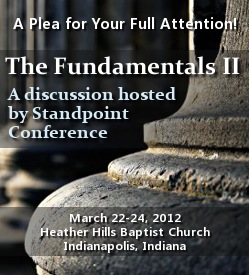Antidote: A Cure for a Common Problem of Evangelicalism and Fundamentalism

The first thing Aaron Blumer (publisher, SharperIron) said to me when we talked about our next conference was “I’m pretty skeptical of the idea of convergence.” Convergence—the idea that fundamentalism and conservative evangelicalism are heading toward, or should be working toward, convergence into one movement—has certainly been what some have perceived Standpoint Conference to be about. We would argue that’s an oversimplification of what we’re about. As our last Standpoint Conference concluded, we made a conscious choice to leave previous issues behind and move on to more critical issues.
Specifically, we believe that fundamentalism and evangelicalism face similar crises. For different reasons, fundamentalism has lurking at its most conservative end some who are less concerned with doctrine than they should be. Evangelicalism has, in the mainstream, those who are also less concerned with doctrine than they should be. On the extreme right of fundamentalism, this expresses itself with a near-obsessive attention to stylistic details that distracts from doctrinal issues. On the left of evangelicalism, church growth, political activism and social influence provide similar distractions.
The alarming result is that both are disengaged from issues that have serious doctrinal consequences. Among those on the far right of fundamentalism, the disengagement results from a feeling that the larger problems of Christianity are irrelevant to them. (“All who are to the left of us are ‘liberals’ anyway.”) Among those on the left of evangelicalism, the disengagement results from a feeling that all must be well because their churches are growing numerically.
Meanwhile, battles are being waged over ideas that represent vast theological shifts. These shifts are happening not just in institutions of higher learning, but in the pews. Rob Bell preaches a form of universalism, and thousands don’t know how to respond—or feel the need to soft-pedal their rejection. N.T. Wright’s New Perspective on Paul is only dimly understood (if at all) by the vast majority of those reading this article. The gay theologians advance their theories and they are uniformly rejected—but few realize that they are using hermeneutical models that are only slightly more radical than the ones taught in our colleges and seminaries. Ground is given, or freedom granted, on the roles of women in leadership, hermeneutics, creation models, eschatological views, all without recognizing that all of the changes are attached to theological structures that mean something and that changes in one area are harbingers of other changes to come—or changes that have already been made in theological viewpoints.


Discussion